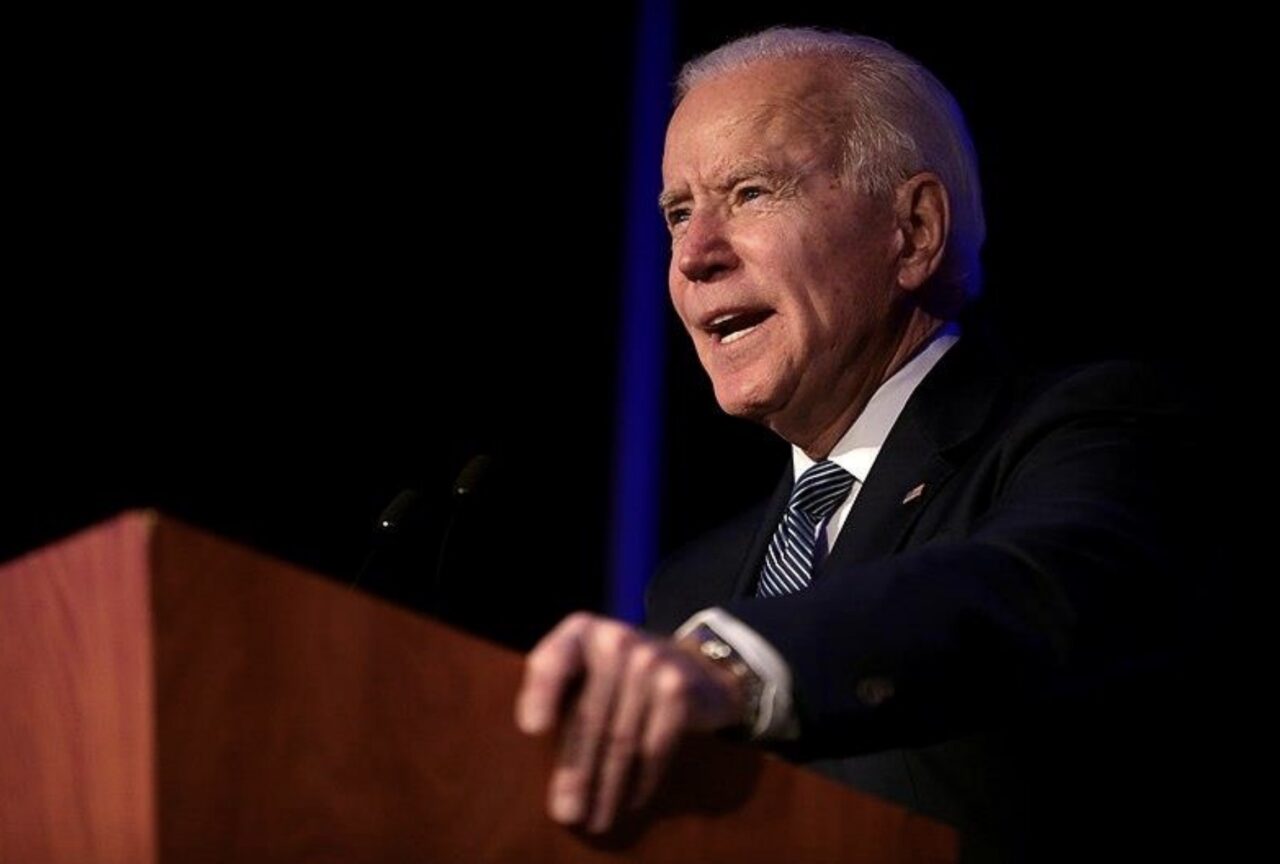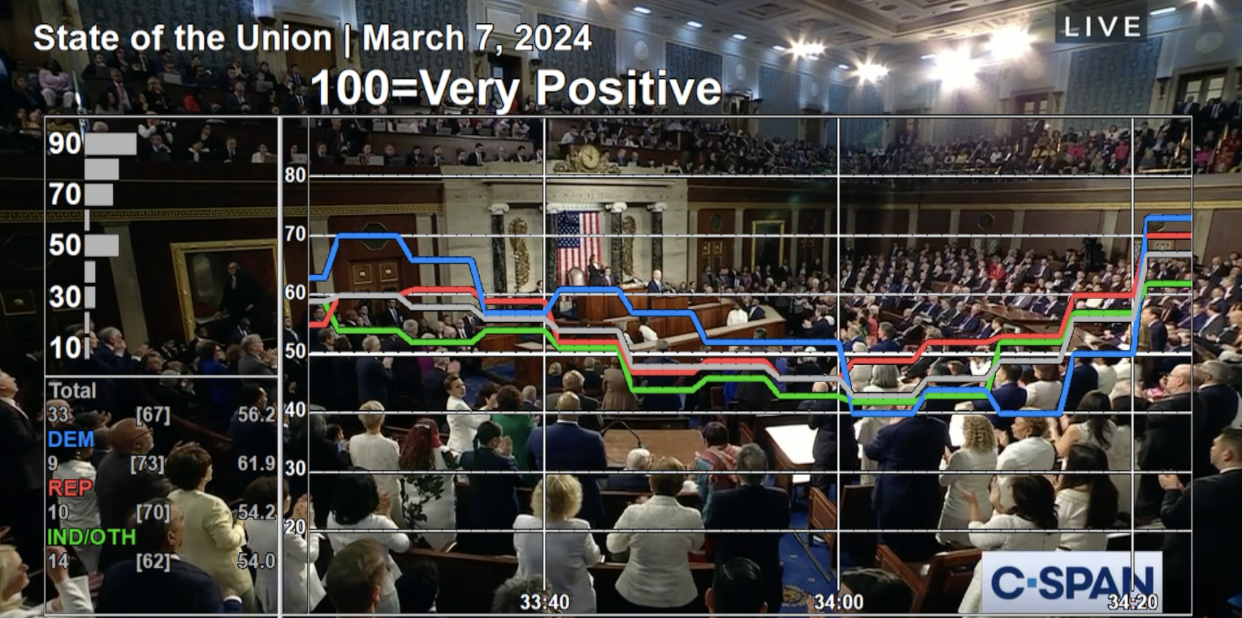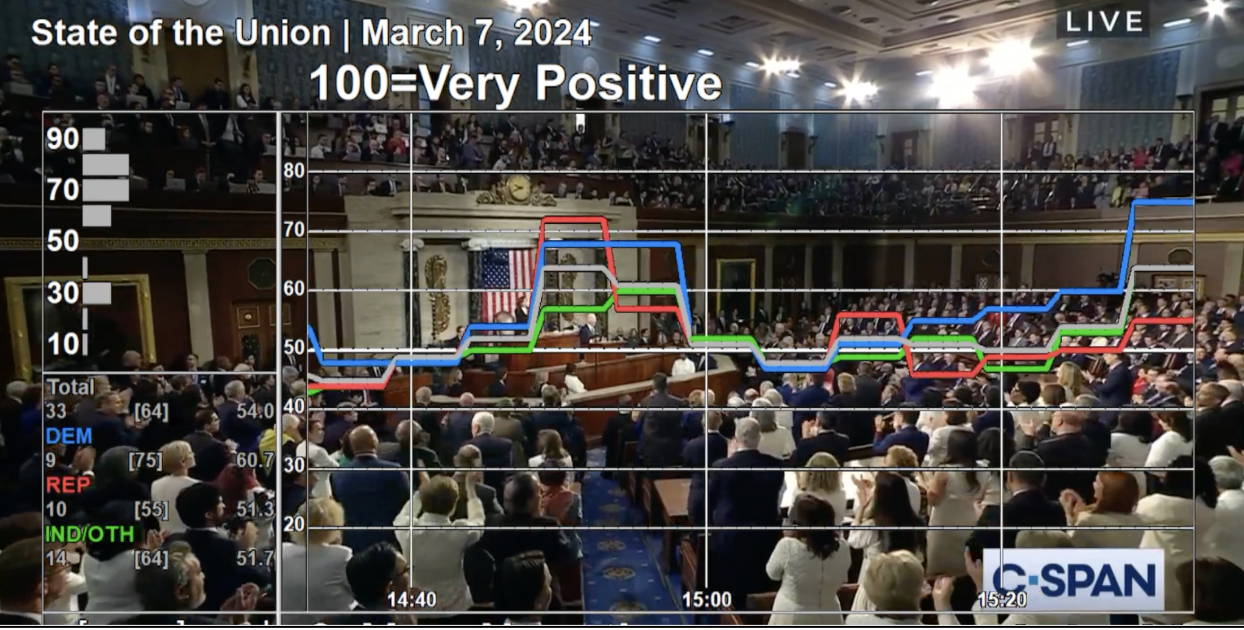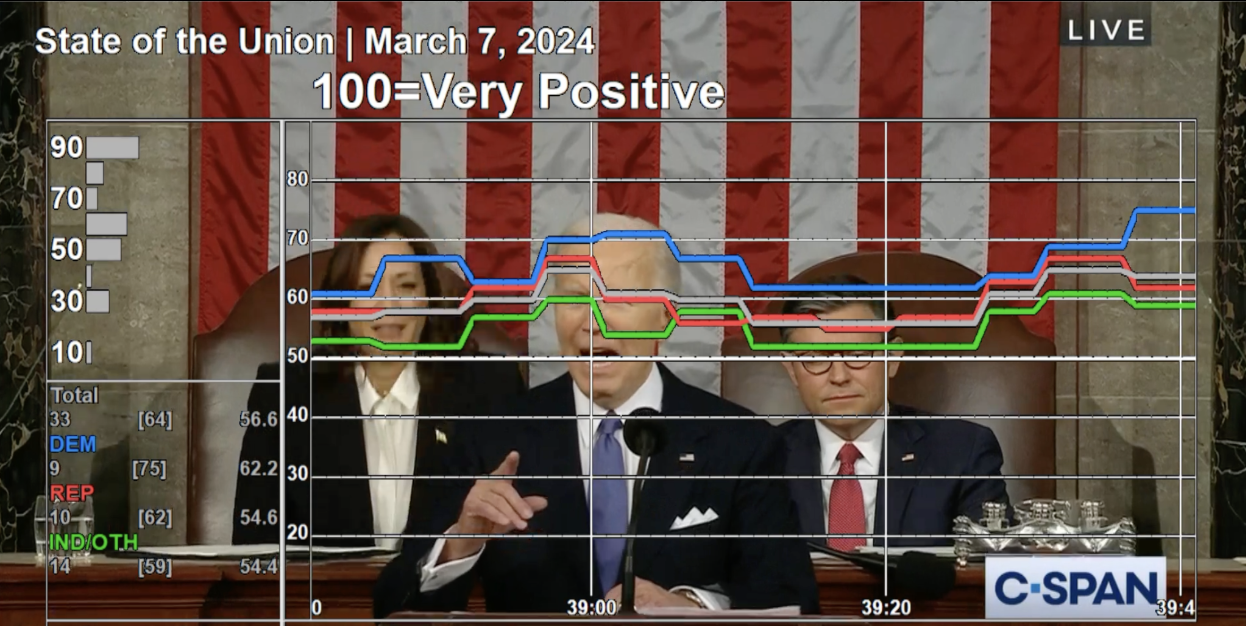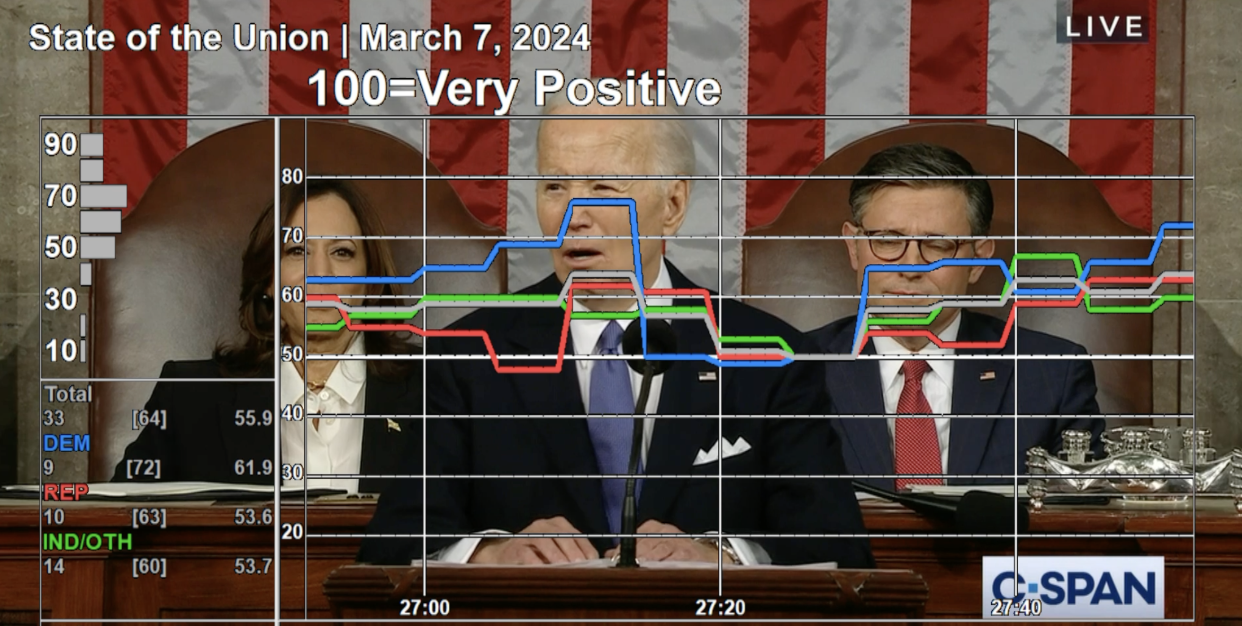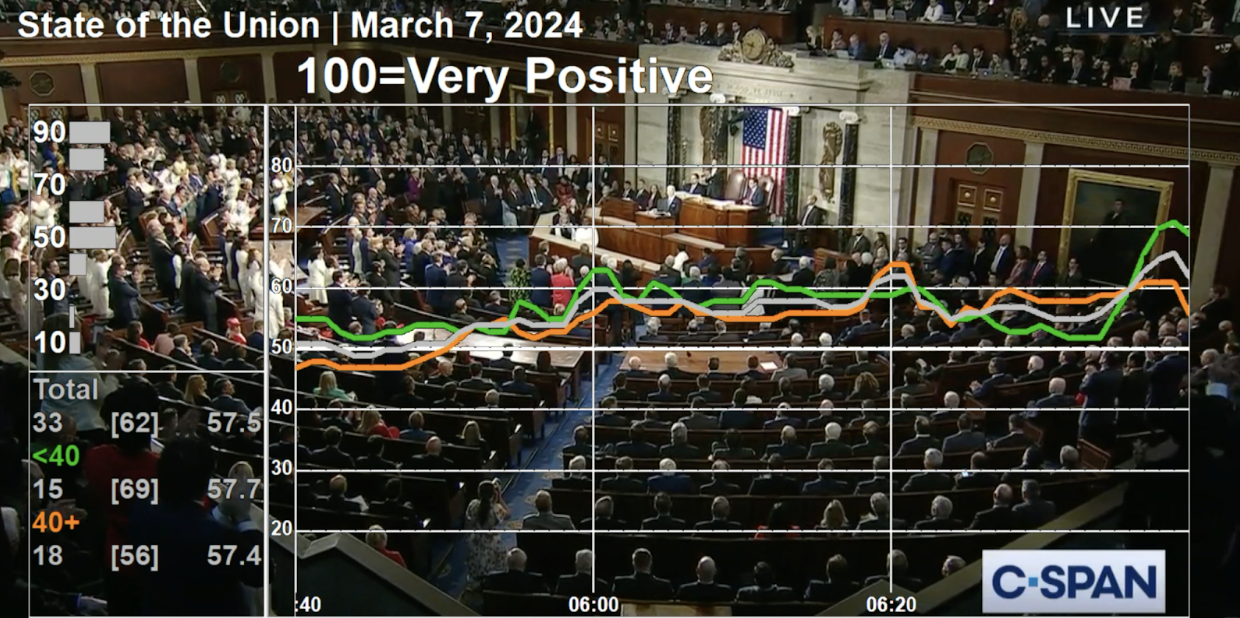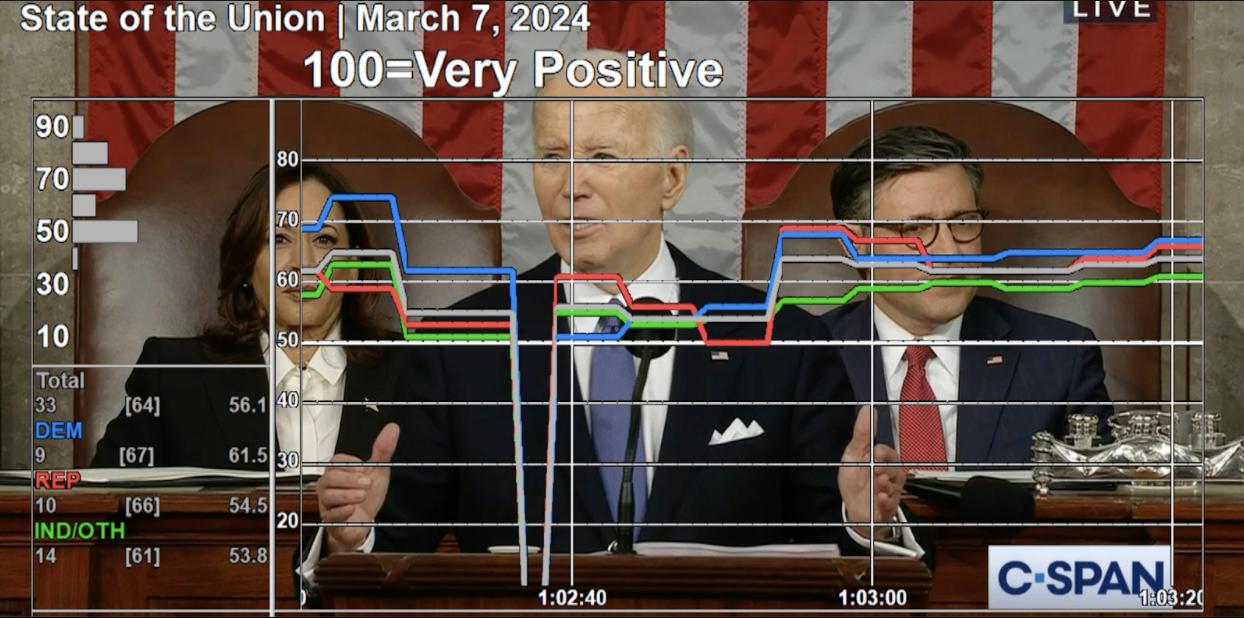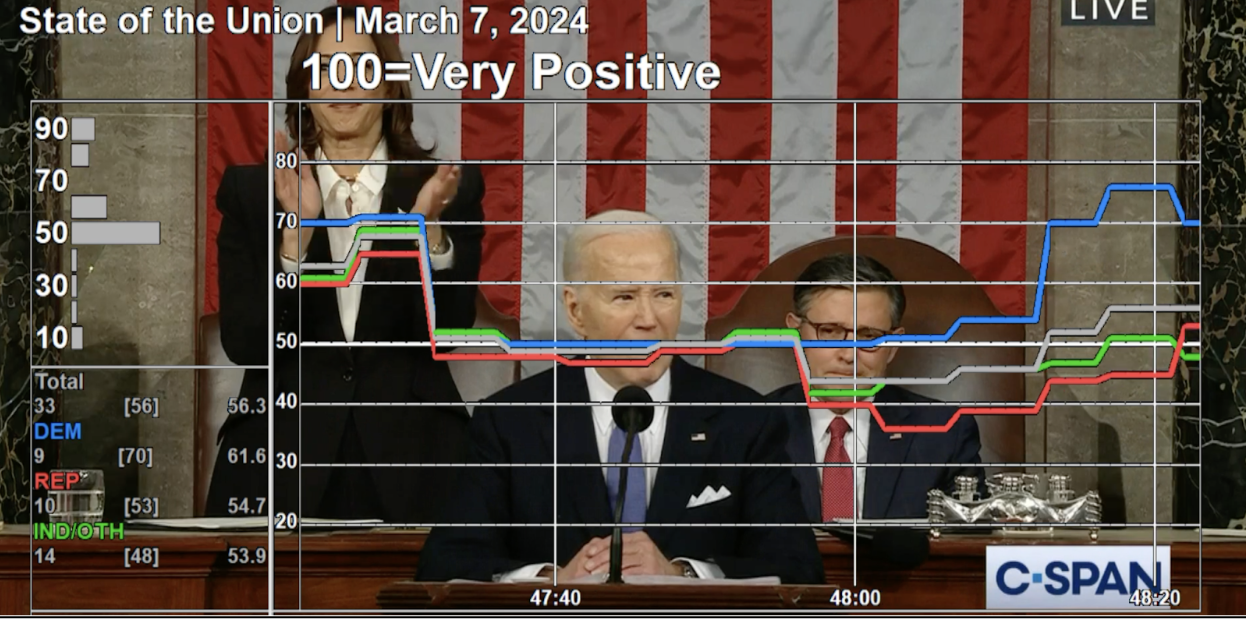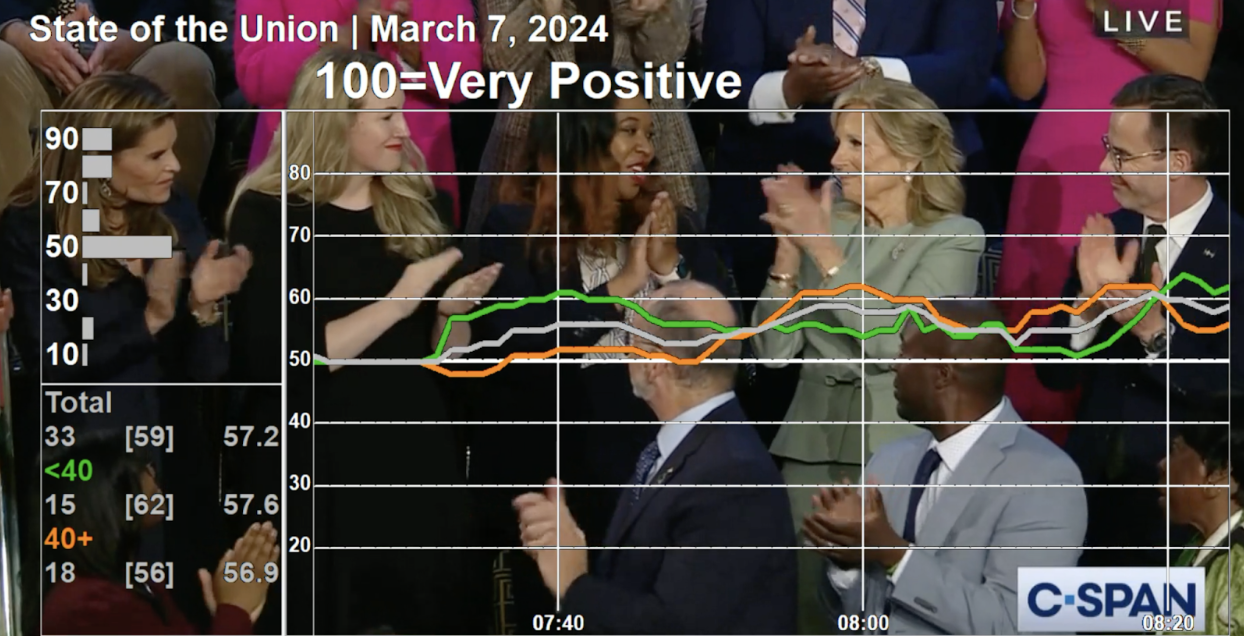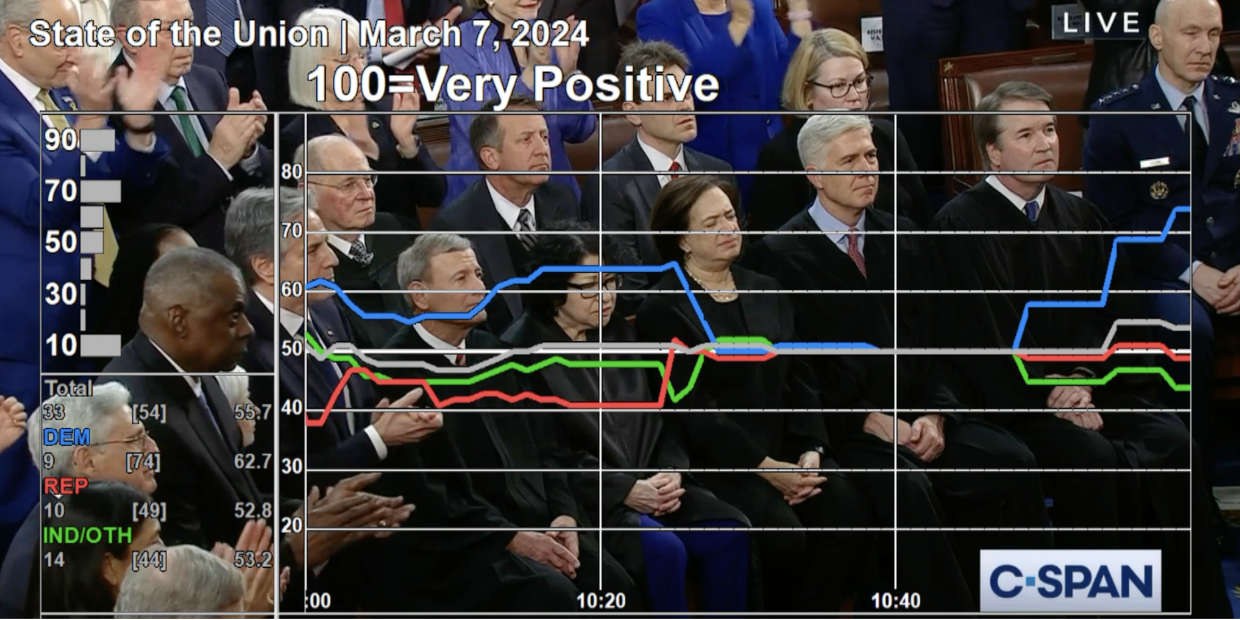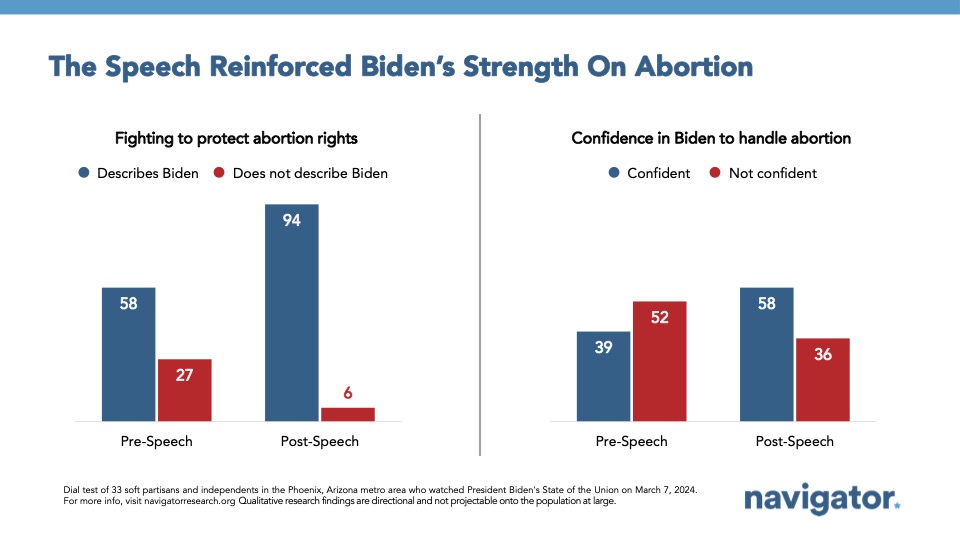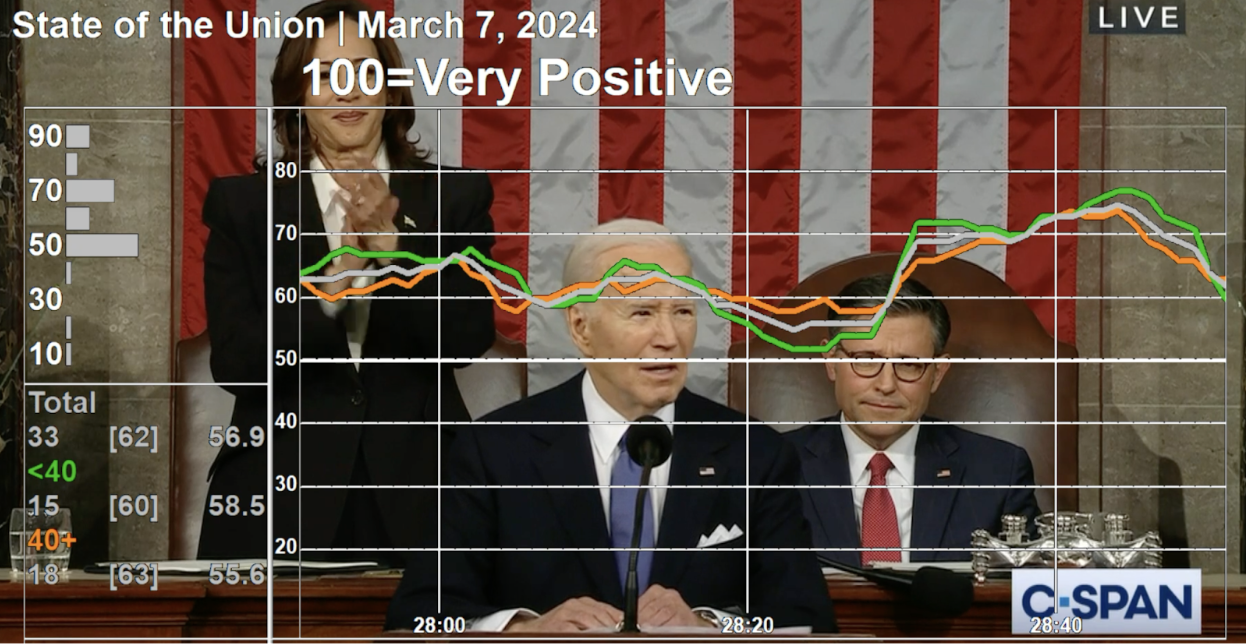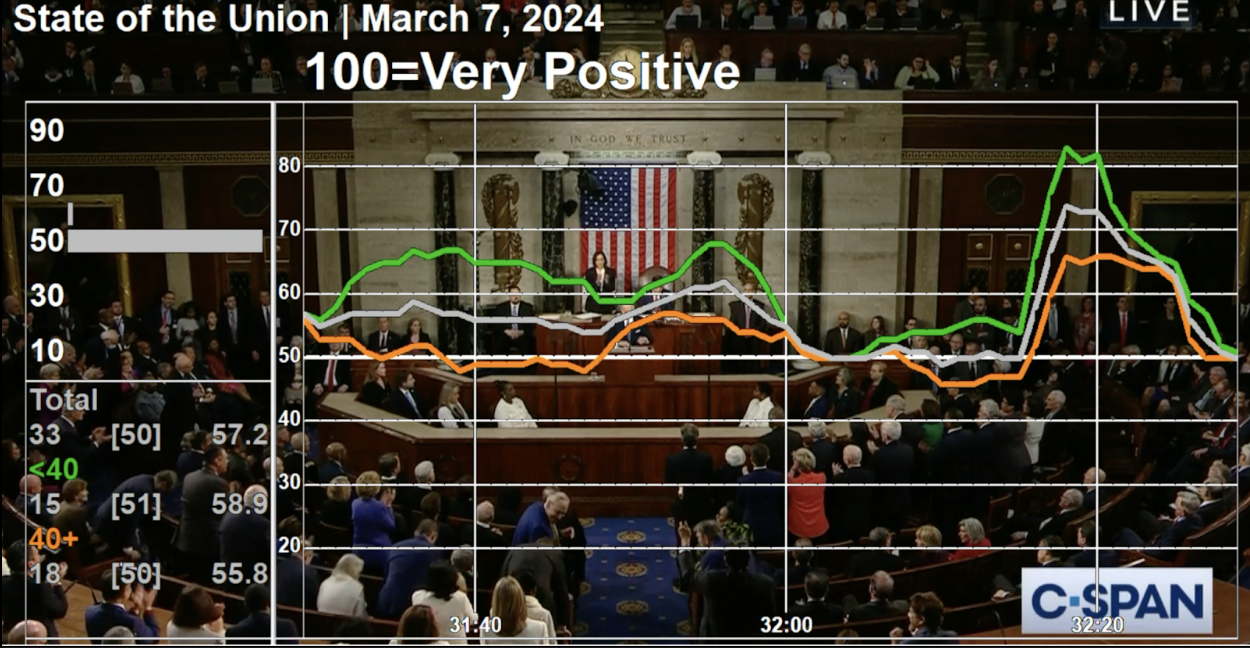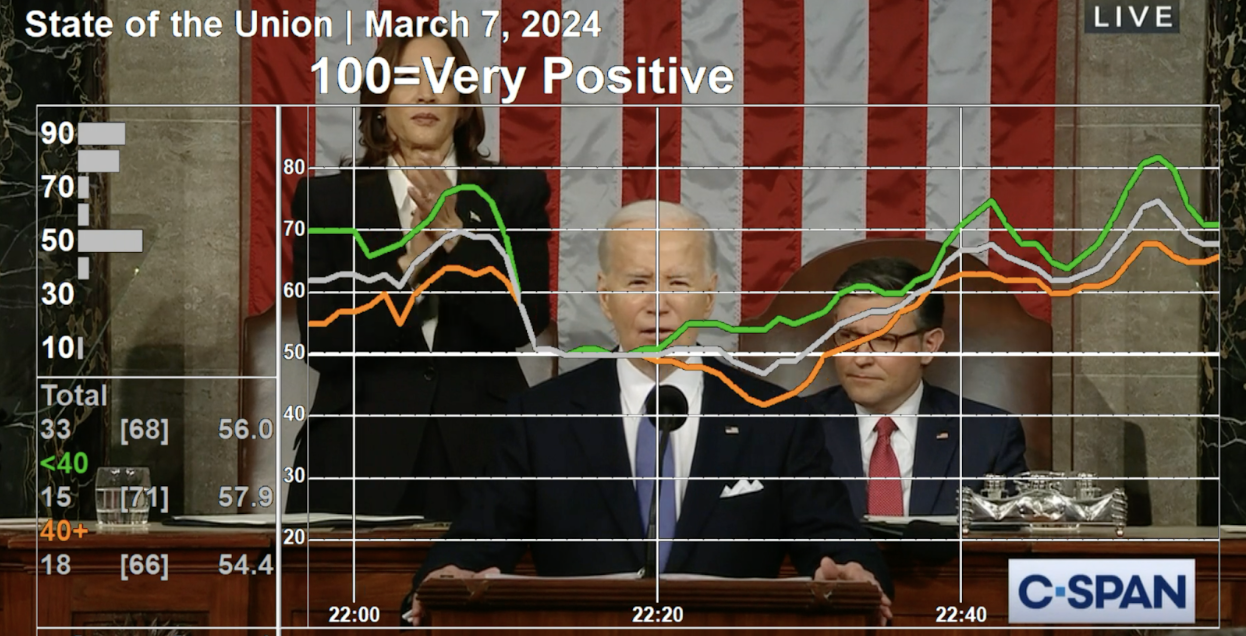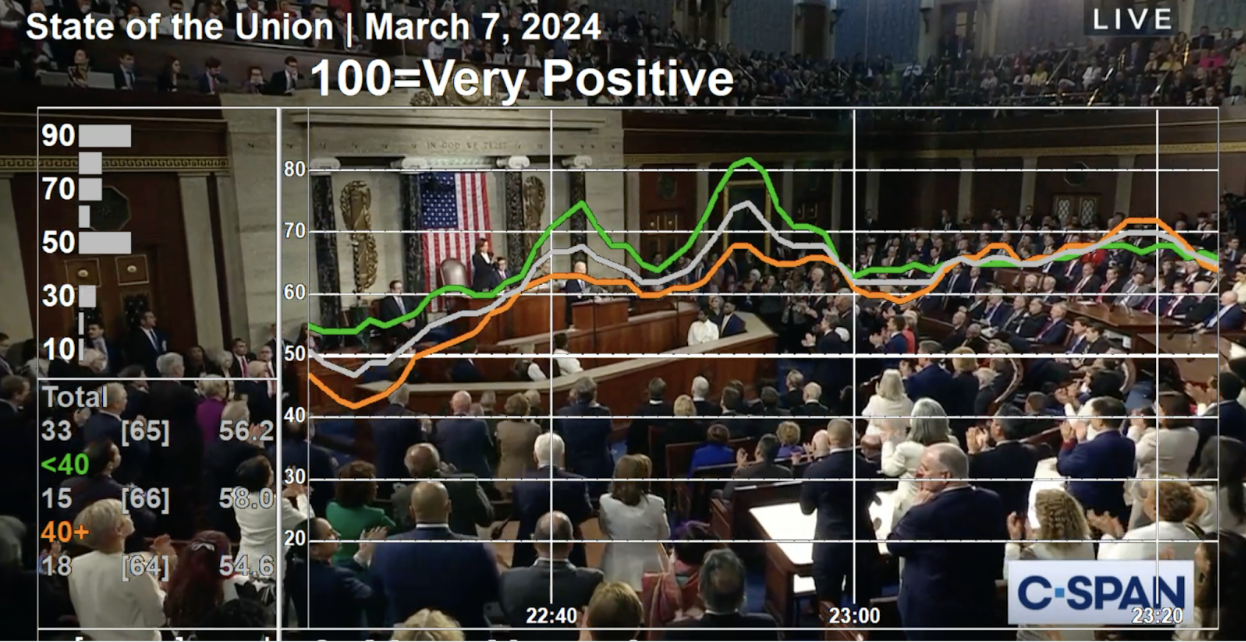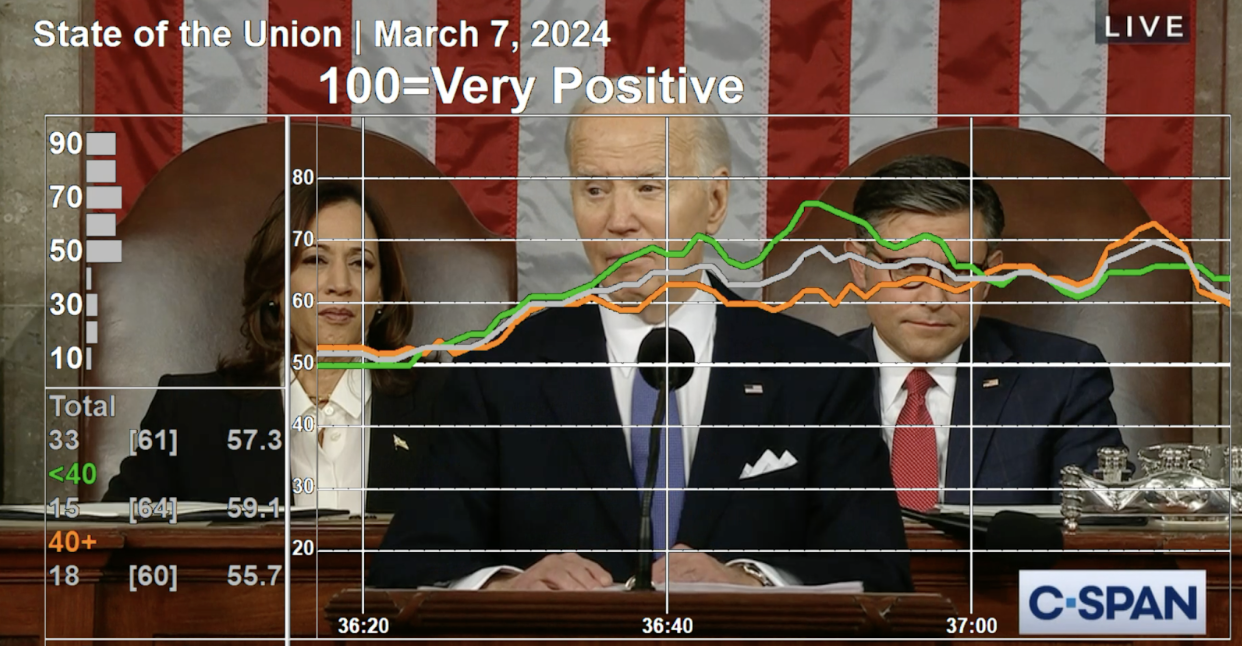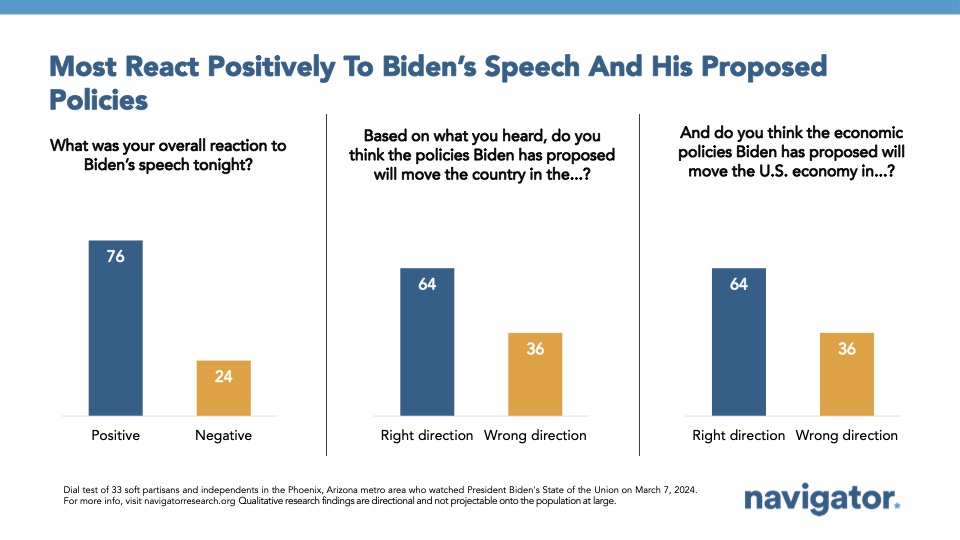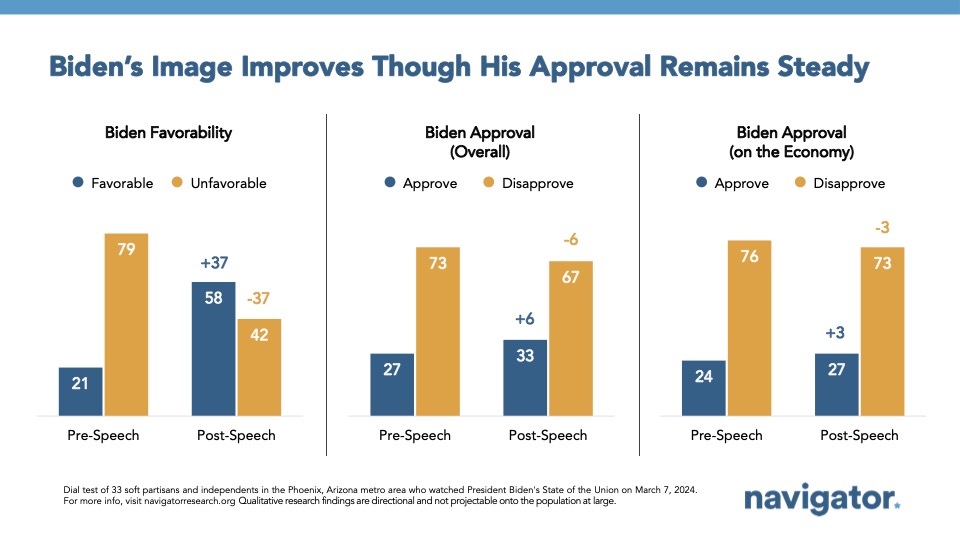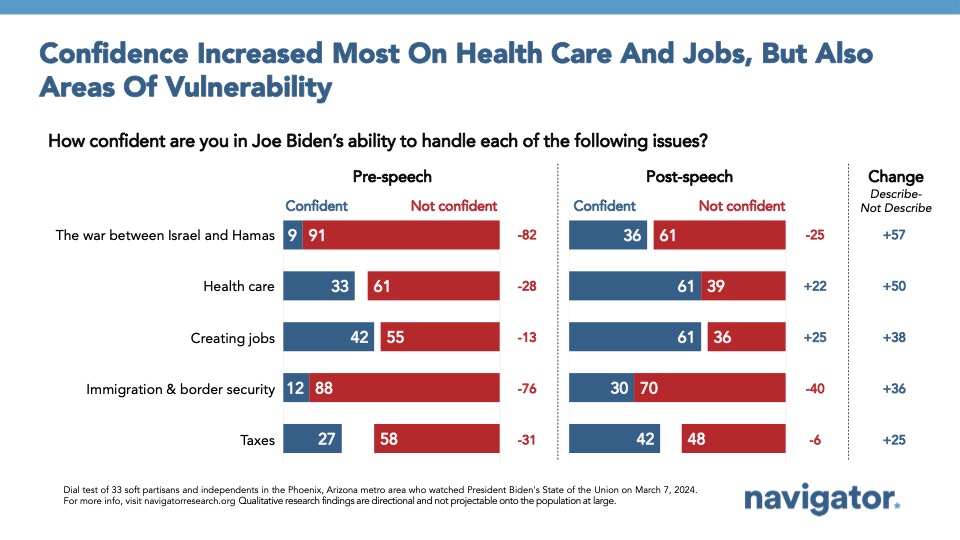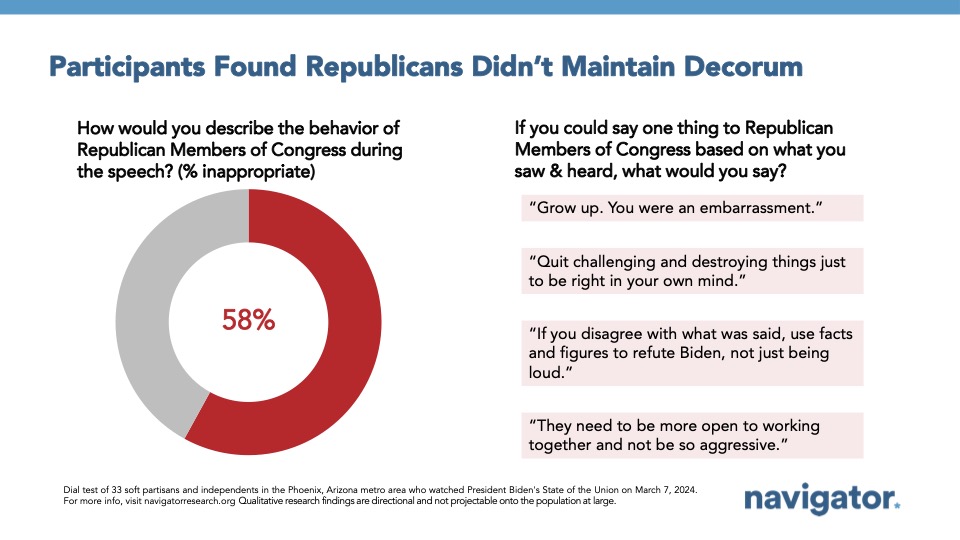Dial Test: State of the Union 2024
This Navigator Research report contains findings from a live-reaction dial group Navigator conducted in the Phoenix, Arizona metro area last night analyzing how soft partisans and independents responded to President Biden’s State of the Union address in real time. Over the course of last night’s address, 33 Arizonans watched the State of the Union while holding a dial with values ranging from 0 to 100. As President Biden spoke, participants continuously adjusted the dial, moving it toward 100 when they felt positively about what President Biden said and toward 0 when they felt more negatively. We’ve analyzed those reactions and distilled them into a few key findings.
The Economy
Soft partisans and independents were consistently positive when President Biden made the connection between the policies of his administration and how they would help the middle class. One of the most effective lines of the entire State of the Union was “the middle class made this country strong, and unions made the middle class,” when dial reactions hit nearly 70 across age and partisanship, with even higher ratings of 75 when following with “…when Americans get knocked down, we get back up!” Some of the specific economic policies President Biden highlighted which received some of the strongest positive dial reactions included:
- Creating a Fairer Tax System: When President Biden said “it’s my goal to cut the federal deficit $3 trillion more by making big corporations and the very wealthy finally pay their fair share,” the dials moved upward to 70 among Democrats and 60 for Republicans. Biden’s position on taxes was even more popular when contrasting who would pay more in taxes compared to who would not: “Nobody earning less than $400,000 will pay an additional penny in federal taxes… not one penny.” The dials moved to 75 among Democrats and were above 60 for both independents and Republicans.
- Infrastructure and Domestic Semiconductor Manufacturing: The dials were consistently positive when President Biden talked about infrastructure and the CHIPS and Science Act, with ratings positive across partisanship after Biden said: “On my watch, federal projects like helping to build American roads, bridges, and highways will be made with American products built by American workers creating good-paying American jobs!”
- Junk Fees: When President Biden said, “I’m also getting rid of junk fees,” there was a small uptick from neutral on the dials, but participants of all parties soared to above 60 (and Democrats above 70) when Biden specified cutting credit card late fees (“My administration just announced we’re cutting credit card late fees from $32 to just $8. The banks and credit card companies don’t like it. Why? I’m saving American families $20 billion a year with all of the junk fees I’m eliminating.”), demonstrating the importance of connecting specific types of fees with the term “junk fees.”
- Lowering Housing Costs: President Biden announced policy proposals helping both homeowners (“I want to provide an annual tax credit that will give Americans $400 a month for the next two years as mortgage rates come down to put toward their mortgage.”) and renters (“For millions of renters, we’re cracking down on big landlords who break antitrust laws by price-fixing and driving up rents. I’ve cut red tape so more builders can get federal financing, which is already helping build a record 1.7 million housing units nationwide.”) In both cases, the dials were positive across partisanship, with Democrats above 70 and each of independents and Republicans at 60 or above after both announcements.
Democracy
Standing for free and fair elections, against political violence, and fighting for the expansion of voting rights caused dials to spike across partisanship and age. After the State of the Union address, participants’ perceptions of Biden’s ability to protect democracy increased from an even split before the speech (48 percent confident – 48 percent not confident) to 22 points more confident than not after the speech (55 percent confident – 33 percent not confident). When speaking about the events of January 6th and Republicans “burying lies,” dials hovered to slightly below 60. However, the dials hit a high point when Biden landed on one of his most impactful lines of the speech on respecting the outcome of elections (“You can’t love your country only when you win.”) to about 65, especially among younger participants under 40 whose dials spiked to over 70. Continued rhetoric of restoring trust and commenting that “political violence has no place in America” also caused the dials to hover around 70 across partisanship.
Furthermore, the dials rose to over 70, with Democrats and participants over the age of 40 closer to 80, when Biden spoke of creating a future based on “…embracing freedom and democracy. A future based on the core values that have defined America. Honesty. Decency. Dignity. Equality.”
On voting rights and the mention of the late civil rights leader John Lewis, dials also spiked. Dials rose to about 70 when Biden spoke of the Selma marches and the subsequent passage of the Voting Rights Act. This led to a positive moment from participants on Biden’s push to pass the Freedom to Vote Act, with the dials among Democrats rising to 75 and participants under the age of 40 jumping to about 60.
Abortion
Biden made it a point to call out attacks on freedoms that stem from the overturning of Roe v. Wade, including the story of Latoya Beasley, a social worker from Birmingham, Alabama and how Alabama’s recent decision jeopardizing IVF treatments prevented Latoya from completing a procedure to have her second child. He emphatically called for “Congress to stand up for families like hers” and to “not wait any longer and guarantee the right to IVF nationwide.” His statements here saw strong support on dials at 60, with younger participants under 40 scoring this slightly higher.
Early in the speech, Biden said: “In its decision to overturn Roe v. Wade, the Supreme Court majority wrote: ‘Women are not without electoral or political power.’ No kidding. Clearly those bragging about overturning Roe v. Wade have no clue about the power of women in America. But they found out when reproductive freedom was on the ballot and won in 2022, 2023, and they will find out again in 2024.” Democrats spiked to 75 after this statement, and notably, Republicans and independents did not dial down from neutral (50) after this statement. In our latest national survey, 66 percent of all Americans identified as pro-choice, including 85 percent of Democrats, two in three independents (64 percent), and a nearly even split among Republicans (net -3; 47 percent pro-choice – 50 percent anti-abortion).
- After the speech, participants’ belief that the statement “fighting to protect abortion rights” described Biden well improved from net +31 before the State of the Union (58 percent describes him well – 27 percent does not describe him well) to net +88 after the speech (94 percent describes him well – 6 percent does not describe him well). Additionally, confidence in Biden to handle abortion improved from net -13 before the speech (39 percent confident – 52 percent not confident) to net +22 after the speech (58 percent confident – 36 percent not confident).
Education
Strengthening the education system and expanding educational resources was extremely popular among these soft partisans and independents. One of Biden’s most well-received statements during his State of the Union address was his call for universal preschool for 3- and 4-year olds, where dials went up to 75. The spike was relatively consistent across age, with slightly higher favorability among those under the age of 40.
- President Biden also stated he wanted to make college more affordable and increase Pell Grants, leading to a positive spike in the dials to over 75 and to 85 among those under the age of 40. During President Biden’s final remarks on education, he said he wants “to give public school teachers a raise”, where the dials went to nearly 75 and to over 80 among those under the age of 40.
Health Care
Biden’s remarks on health care started with a focus on costs, specifically the $35 cap on the monthly cost of insulin and the ability for Medicare to negotiate drug costs. The reference to caps on the cost of insulin was incredibly popular, with participants giving the remark a rating in the high 60s. Dial ratings shot up again to the mid-70s — one of their high points of the night — when Biden said that he wants to “…cap the cost of insulin at $35 a month for every American that needs it.”
When President Biden tied Medicare’s ability to negotiate drug prices to savings for taxpayers (“We’re not just saving seniors money, we’re saving taxpayers money. We cut the federal deficit by $160 billion dollars.”), it was another high point for participants on the issue of health care, with all participants coming in at about 70 with consistent support across age and partisanship.
Later in his speech, Biden made a call to protect seniors, calling out Republicans in Congress for their threats to cut Social Security and Medicare, and doubled down on his commitment to stop anyone who threatens to cut them. These comments were seen as overwhelmingly positive by participants, hitting 70 on the dials. While participants under 40 were generally more favorable of Biden’s remarks throughout the speech, these remarks defending Social Security and Medicare resonated most with those over 40.
Key Takeaways
Soft partisans and independents in Arizona had largely positive reactions toward the State of the Union address delivered by President Biden last night. Three in four participants in this live-reaction dial group had a positive reaction to watching President Biden’s address (76 percent), with about two in three agreeing that they thought the policies Biden proposed would move both the country and the U.S. economy in the right direction (64 percent each).
- There was also a significant swing among these participants in terms of their favorability toward President Biden: initially, nearly four in five participants started with negative favorability of Biden (net -58; 21 percent favorable – 79 percent unfavorable), but after viewing the entirety of Biden’s State of the Union, his net favorability was 16 points above water (58 percent favorable – 42 percent unfavorable).
- However, despite a large uptick in Biden’s favorability ratings among these participants, changes in his job handling was more muted (a net +11 shift) and his approval ratings remained underwater following the speech (33 percent approve – 67 percent disapprove).
- President Biden improved his standing among these participants on a number of different issue dimensions including “standing up to corporations” by a net +76 (from net -45 to net +33; 61 percent describes him well – 27 percent does not describe him well post-speech), is a “strong leader” by a net +64 (from net -76 to net +12; 42 percent describes him well – 55 percent does not describe him well post-speech), “is up to the job of president” by a net +60 (from net -70 to net -10; 42 percent describes him well – 52 percent does not describe him well post-speech), and that he “stands up for the middle class” by a net +55 (from net +9 to net +64; 61 percent describes him well – 27 percent does not describe him well post-speech).
- Similar to last year’s State of the Union when 59 percent of participants described the behavior of Republican members of Congress during the speech as inappropriate, a nearly identical 58 percent of participants said the same after this year’s State of the Union.
